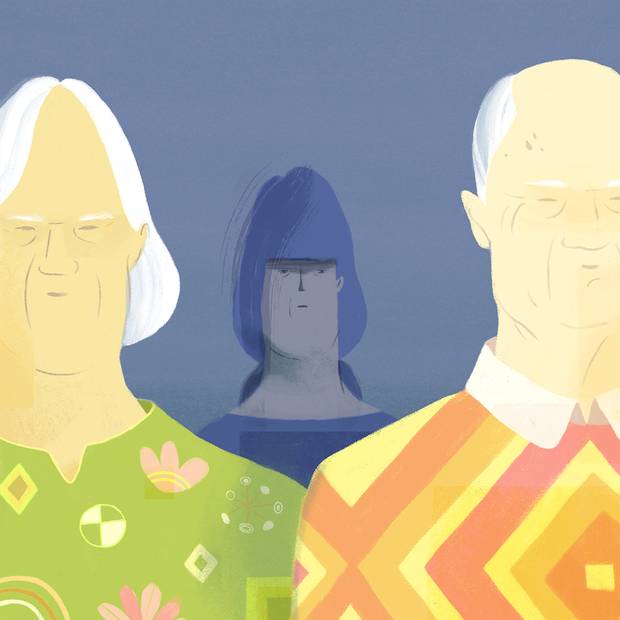Facts & Arguments is a daily personal piece submitted by readers. Have a story to tell? See our guidelines at tgam.ca/essayguide.
We are halfway down the back stairs when I see Mom's thin-soled shoes.
"Mom, I think you should wear your boots."
She exhales the F-bomb and stomps back to the door, which is locked.
"Dad?" But he's not wearing his hearing aid. I retrieve his key, pass it to Mom who fumbles with the lock, then slams the door. I hear Dad whistling as he waits beside my car.
Driving through the ice and snow and -22 C of Calgary, my dad tells me what a good driver my sister is. "Like your brother," says Mom. I park between two half-tons and Mom attempts to leave the front seat without undoing her seatbelt – she doesn't notice as I pop the release. Dad holds her door open while whistling random notes of patience. Across the gravel-strewn ice, both walk with heads down, hands in pockets.
A young receptionist asks the perfunctory, "Bottle of water? Tea, coffee?" I decline.
Mom leans into the counter; her silver hair short and stylish, her smile sincere, "I'd love a coffee." She follows the girl around the desk and watches the brew-pod process while my Dad hovers, lips pursed in a mute whistle, declining tea when there is only cream not milk, but then reconsiders, perhaps a weak coffee? Deliveries and phone calls are ignored as the fresh-faced receptionist focuses on my parents.
I reach out to take the steaming mug from Mom so she can remove her coat. She huffs and hands it over like a chastised child. Once settled on the sofa, she takes a taste, rises back to reception.
"Can I trouble you for sugar? It's a little strong." She says something I can't hear and they both laugh. I try to remember the last time I made Mom laugh.
We're at the lawyer's office to enact enduring power of attorney. Mom is 78, her dementia confirmed a year ago. Dad is six-years older and losing ground fast, partly from the stress of looking after his wife of 59 years and partly from his own aging brain; he often talks in circles, deliberates decisions and, once made, forgets them. His rationalizations are irrational: He left a hair dryer running overnight to dry out the lighter on his barbecue, on low he countered.
Billie comes round the corner, "Hey there strangers!" She shakes my father's hand, reaches for my Mom, gives her a bear hug. "How are you both? You look grrreat!"
She ushers us into a conference room. Mom wants to know how her three kids are. Dad makes light of how well they look. As it's a protocol for signing, I leave and return to reception. I ask if I can bring my parents for a coffee everyday. "Of course! They're sweet!"
Behind the scenes, I talk to home care, medication-assistants, a social worker, pharmacists, driving examiners, the bank manager, assorted doctors and nurses. I pick up pills, make meals, lists and appointments and communicate with my siblings.
I'm called back when the papers are signed. Billie is listening to Dad's years of fixing Hercules aircraft and crashing in the Peruvian jungle. Mom shares she'll soon be a great-grandmother. Billie says again how great they look. Dad says in his Welsh lilt, "All a facade," and they collectively laugh because he says it so jovially.
He's covering up their arguments, Mom's instant anger, the heartache of losing her driving licence. She no longer cooks, reads or watches TV. An appointment will unsettle her days beforehand: she misses the cue of darkness to tell the difference between 2 a.m. and 2 p.m., so she wakens my dad, worried they'll be late. He is exhausted and frayed, but still proud – a straightforward decision for a safer stove was deliberated for months and he refuses any conversation of not living in their own home.
Today's signing of documents signifies further erosion of their cognition. As we step into the elevator, Mom looks past me, "Billie's a lovely girl." I smile and contemplate whistling.
Later, I ask Mom what would make her happy. "To be around nice people." She looks over my shoulder, "Like your brother."
She's paranoid I am going behind her back, which I am. Enlisting home care to administer her pills after she denied taking a week's worth over the course of a day, despite packaging by the pharmacy, relabelling by me and kept beside the special clock to confirm the day of the week, as well as morning, afternoon, evening or night. She thinks I work for her doctor, that the clock doesn't work right, especially at 2 a.m., and "Why can't I mind my own (insert expletive) business?"
People tell me this is not my mom, that her disease is what makes her spiteful.
But I disagree. This is my mom, and who she is now. Her temper and paranoia are who she is now, in dementia. I am grateful she does not look at me, because I don't want her to see all she's been robbed of.
Her pretense with others is a veneer of grace: with me, her guise is shed, unfurling the frustration of a world gone haywire. There is honesty in this.
As she continues to decline, I'm not hopeful for love nor gratitude. I cope behind my own façade of wary patience, juggling her and my own full life, mourning the woman who every summer grew sweet peas – Royal Family – just for me.
Donna Elaine Williams lives in Calgary.
